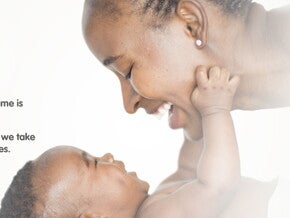
Hunger
Hunger is a common reason why babies cry.
- Pick your baby up and try to soothe her. If she does not settle despite a clean dry nappy, she may be hungry – feed her.
Pain and discomfort
Gas, or air bubbles, can cause pain and discomfort.
- Try holding your baby in an upright position for about 20 minutes after a feed. Do not sit up half the night to burp your baby. She will often do this herself when placed on her stomach on a firm mattress or across your lap.
- Massage often relieves discomfort.
Burping
Your baby may swallow a little air when feeding. Burping helps to remove air and relieves the uncomfortable pressure in her stomach.
There are several different positions for burping your baby and you will soon learn which is the most effective one to use.
Over the shoulder
- Hold your baby upright against your shoulder.
- Support her bottom with one arm and gently pat or rub upwards against her back.
Across your lap
- Lie your baby on her tummy across your lap.
- Support her head with one hand and gently rub or pat her back with the other hand.
Sitting
- Hold your baby in a sitting position on your lap.
- Support her chin with your one hand and lean her forward against the heel of that hand to exert gentle pressure on her tummy. Use the other hand to rub or pat her back.
Other sources of pain and discomfort in a healthy baby
Colic
Inconsolable crying for which no physical cause can be found is usually an indication of colic. The baby becomes red in the face and draws her legs up as if in pain. This can continue for three hours a day, and can last from three weeks to three or four months. Colic is very rare in babies younger than three weeks.
Exclude hunger and infection (usually viral) before assuming your child has colic, as these can present in exactly the same way as colic.
- Try the ways to stop her from crying as described here.
- Consult your doctor before administering any medicines to alleviate colic.
- Remember, you are not the cause of the colic and it will pass with no lasting effects.
Boredom
Babies feel lonely, and miss the warmth, noise and comfort of the womb.
- Hold and love your baby.
- Prop her up in a chair to watch your activities around the home as she gets older.
- Socialise with your baby, as she is interested in other people from an early age.
Fatigue
Fatigue is one of the common causes of crying. Overtired babies are irritable and cranky even when they get older.
- Feed, cuddle, rock your baby and then place her in her cot. Leave her for five minutes. If she still does not fall asleep, pick her up, love her, burp her and then put her back in her cot.
Overdressed or underdressed
A baby feels the heat as we do from the age of about two months. Dress her according to the weather, not the season. Remember, a baby’s hands are usually cold.
- To check your baby’s temperature, put your hand against her back under her vest – it must feel comfortable, not sweaty or cold.
“Off day”
Often a baby has an “off day”. It may indicate tension before a transition to another developmental stage. A quiet day indicates she is operating at a consistent level.
Effective means to stop crying
- Pick her up and hold her.
- Put her in a baby sling in an upright position against the front or back of your body so that she is close to you, and get on with your chores.
- Take her for a walk outside to help both of you retain your sanity.
- Don’t over-stimulate your baby before putting her to sleep.
- Rhythmic motions can soothe and relax both you and your baby. Cuddle together in a rocking chair with soft classical music to ease the transition from activity to pre-sleep tranquillity.
- Rocking and singing can help to soothe her.
- Make sure your baby is not hungry.
You, the mother
- Take care of yourself.
- Remain healthy and keep your sense of humour.
- Have quiet times with your partner. Communication will help both of you understand how to support each other.
- Emphasise the good, calm, quiet times with your baby, and do not allow her crying to overshadow these times.
- Love your baby all the time, even if she always seems to be crying.
- Try to respond quietly and calmly.
- She will become the lovable baby you had hoped for!
- Enjoy this time – it passes quickly.
If you need extra support turn to family and friends or attend postnatal exercise classes or postnatal support groups. Click here for a list of useful resources.















